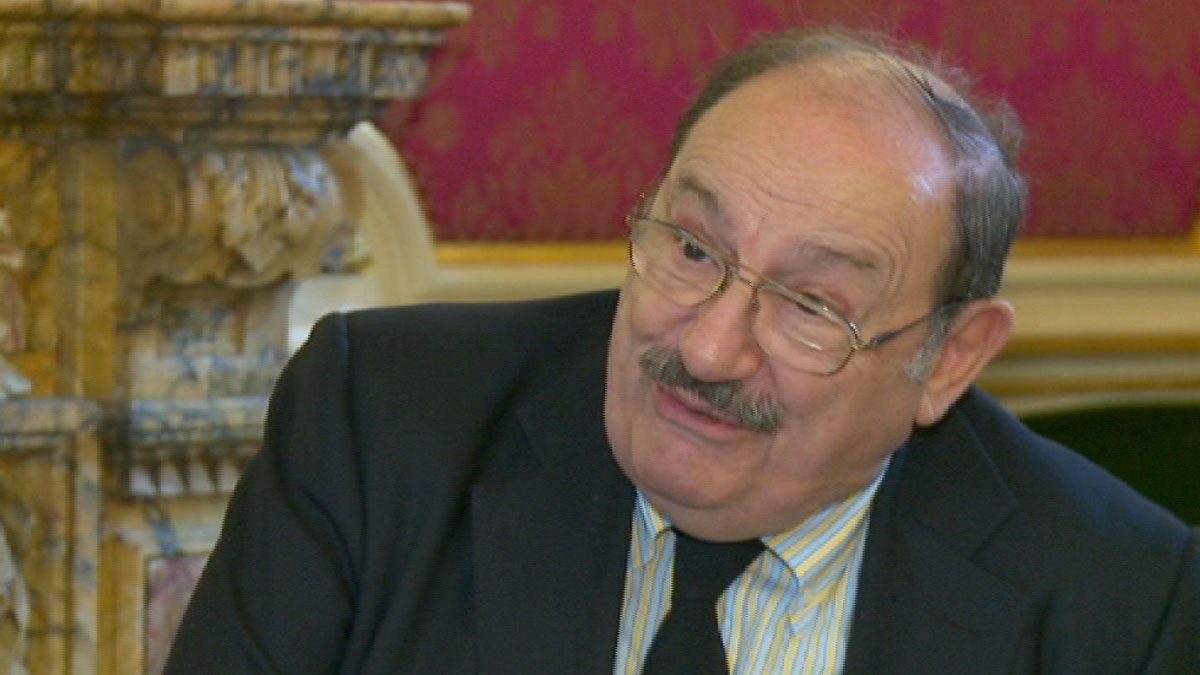Can culture give sense to Europe? That is a question euronews put to Umberto Eco, the Italian intellectual, scholar and novelist.
After addressing the Liberation Forum, Eco spoke to euronews about the end of the Berlusconi era and the crisis in Europe in his usual direct fashion.
Frédéric Bouchard, euronews: “Umberto Eco, the question of forgery is at the heart of your latest novel, ‘Cemetery of Prague’. To quote from the novel “It is the hidden things behind things.” Is that a definition of Silvio Berlusconi?”
Eco: “No, my novel is about forgers, people who produce false records. Well, Berlusconi has done that to get rid of political opponents, if you want you can make a connection with that, but since my novel is about the Protocol of the Elders of Zion – a text purporting to describe a Jewish plan for achieving global domination – and its effect on humanity, I dare not say that Berlusconi ever acted on that scale.”
euronews: “How was Berlusconi able to stay in power for so long and lead the government in Italy?”
Eco: “Berlusconi was — is — a great communicator, he is a charmer, certainly a charmer of the public, the middle-aged people who are 50 or older, who watch TV and see him on TV. But he could not have a majority, he always worked with a 30, 40 percent lead and an electoral law that allowed him to dominate the parliament.”
euronews: “To dominate for a very long time.”
Eco: “A very long time. Fortunately the rest of Italy managed to resist. How could Italy accept Berlusconi? A German journalist asked me the same question, I answered him by asking how was Germany able to accept Hitler, how could France accept Vichy?
“Go back to the early 1990s and the crisis and allegations of corruption with the Christian Democrats. There was a huge void, Berlusconi had the political intelligence and the ability to make alliances with no ideological issues, just as in a cattle market, he created allegiances. Then the Catholics — with reported scandals surrounding him — withdrew their support, so there was no room for Berlusconi in politics.”
euronews: “But so far, the fact Silvio Berlusconi is no longer in power is due to an external crisis, which actually affects Italy, the euro crisis, it is not due to the resistance of the Italian people.”
Eco: “I don’t agree, during the year he has been subjected to constant criticism from most of the press, intellectuals, etc. It was used to damage Berlusconi’s image, to show his weaknesses, and then at some point Berlusconi had to yield to the fact that he was not accepted by the European leaders. His fall coincided with the fact that Italy is now represented by a respectable man.”
euronews: “What is your opinion on how Mario Monti became prime minister, do you think there is a crisis with European democracy?”
Eco: “No, the Italian Constitution can be considered the most advanced in the world because it was created after the end of the second world war and to “regulate” against the risk of a dictatorship. It means the President of the Republic, which is elected by parliament, in certain circumstances can propose to parliament a government that can be approved or rejected by parliament. So everything went according to the letter of the Constitution.”
euronews: “There was no financial coup then?”
Eco: “No, ah, unless you subscribe to a universal conspiracy, a paranoia, you can say that the Jews are behind the Freemasons, I’m …
euronews: “No, it was mostly on a sociological level look at the example of Greece, the example of Italy, the lack of a referendum in Greece.”
Eco: “There were financial problems, as in other European countries, which Berlusconi was unable to solve, even some of his supporters began to distance themselves, and since he had created a law approved by himself — which was quite a mistake — in which the deputies were not elected by the people but appointed by the President-elect, it meant he surrounded himself with, ‘yes men’. They are people with no morals, they were ready to betray him and they did.”
euronews: “Is the euro crisis a theme, an inspiration for a new novel for you?”
Eco: “No. You believe that writers are the oracles that there isn’t a question which the novelist can’t answer. The writer though can raise a question, and there are questions that a writer cannot answer, but it’s a question that a writer can ask. You believe the euro crisis can be a positive thing to create new ideas like this?”
euronews: “So in this crisis, what can culture do to solve the crisis?”
Eco: “I can’t solve the economic crisis, I am a victim like the everyone else, I lost some….”
euronews: “Is it possible that culture can give Europe a ‘raison d’etre’?”
Eco: “I’m just saying that there is a European cultural identity which cannot be clearly defined because it is intangible, but it does exists: using it as a base we could start to unify Europe, to think of a political Europe, an economic Europe. But I can’t talk about an economic Europe; I am not competent in that area and it would be dishonest to discuss it on television.”
euronews: “Precisely, the economic Europe is faltering, can culture provide some answers?”
Eco “No.”
euronews: “Is there not an opportunity?”
Eco: “No, I do not believe that culture can change the course of the markets, not even Homer could do that.”
euronews: “At this difficult time for Europe and the EU is your sense of European citizenship still strong?”
Eco: “Very strong, yes very strong since my youth!”
